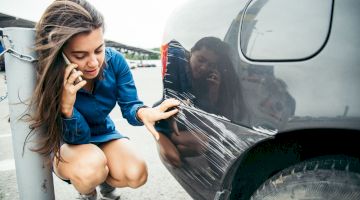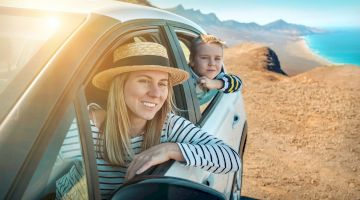- Online car rental since 2005

Car Rental Ireland
Save time and money. We compare the offers of car rental companies in Ireland on your behalf.
- Free cancellation Up to 48 hours prior to the scheduled pick-up time
- Best price guarantee Have you found a better price? Let us know and we will make you a better offer.
- 24000+ pick-up locations Locations around the world

Car Rental Ireland
EasyTerra Car Rental Ireland is an independent car rental comparison site. Our site compares prices from well-known car rental companies so that, as a customer, you can always reserve your car with us at a competitive rate.
Car rental offers in Ireland
Whether you're looking for a small rental car or a station wagon for the entire family, we will always have a suitable vehicle at the lowest price. Below are some examples from our selection in Ireland.

-
Carhire From€ 6 /day -
Budget From€ 9 /day -
Europcar From€ 9 /day

-
Carhire From€ 6 /day -
Europcar From€ 9 /day -
Keddy By Europcar From€ 10 /day

-
Carhire From€ 12 /day -
Flizzr From€ 16 /day -
Sixt From€ 16 /day

-
Thrifty From€ 7 /day -
Dollar Rent a Car From€ 10 /day

-
Thrifty From€ 8 /day -
Hertz From€ 9 /day -
Budget From€ 9 /day

-
Carhire From€ 12 /day -
Keddy By Europcar From€ 18 /day -
Payless Car Rental From€ 18 /day

-
Thrifty From€ 8 /day -
Hertz From€ 10 /day -
Dollar Rent a Car From€ 10 /day

-
Thrifty From€ 9 /day -
Dollar Rent a Car From€ 10 /day -
Hertz From€ 11 /day

-
Thrifty From€ 12 /day -
Dollar Rent a Car From€ 18 /day

-
Carhire From€ 6 /day -
Keddy By Europcar From€ 10 /day -
Europcar From€ 11 /day

-
Carhire From€ 7 /day -
Thrifty From€ 9 /day -
Budget From€ 10 /day

-
Carhire From€ 12 /day -
Keddy By Europcar From€ 14 /day -
Flizzr From€ 17 /day

-
Thrifty From€ 9 /day -
Dollar Rent a Car From€ 12 /day -
Payless Car Rental From€ 12 /day

-
Thrifty From€ 9 /day -
Dollar Rent a Car From€ 12 /day

-
Thrifty From€ 13 /day -
Dollar Rent a Car From€ 17 /day -
Payless Car Rental From€ 18 /day

-
Carhire From€ 9 /day -
Flizzr From€ 13 /day -
Sixt From€ 14 /day

-
Thrifty From€ 10 /day

-
Flizzr From€ 15 /day -
Carhire From€ 16 /day -
Dollar Rent a Car From€ 17 /day

-
Carhire From€ 8 /day -
Europcar From€ 15 /day

-
Carhire From€ 8 /day -
Keddy By Europcar From€ 13 /day -
Europcar From€ 14 /day

-
Carhire From€ 13 /day -
Europcar From€ 20 /day

-
Carhire From€ 9 /day -
Dollar Rent a Car From€ 13 /day

-
Carhire From€ 10 /day -
Flizzr From€ 16 /day -
Sixt From€ 16 /day

-
Carhire From€ 13 /day -
Keddy By Europcar From€ 19 /day -
Europcar From€ 20 /day

-
Carhire From€ 11 /day -
Payless Car Rental From€ 11 /day -
Budget From€ 13 /day

-
Thrifty From€ 12 /day -
Budget From€ 14 /day -
Payless Car Rental From€ 14 /day

-
Keddy By Europcar From€ 16 /day -
Flizzr From€ 18 /day -
Sixt From€ 19 /day

-
Carhire From€ 15 /day -
Keddy By Europcar From€ 17 /day -
Europcar From€ 22 /day

-
Carhire From€ 15 /day -
Keddy By Europcar From€ 17 /day -
Thrifty From€ 18 /day

-
Carhire From€ 17 /day -
Keddy By Europcar From€ 22 /day -
Europcar From€ 27 /day

-
Carhire From€ 15 /day -
Keddy By Europcar From€ 17 /day -
Flizzr From€ 18 /day

-
Thrifty From€ 17 /day -
Payless Car Rental From€ 19 /day -
Flizzr From€ 21 /day

-
Carhire From€ 18 /day -
Keddy By Europcar From€ 23 /day -
Europcar From€ 29 /day

-
Payless Car Rental From€ 17 /day

-
Keddy By Europcar From€ 17 /day -
Dollar Rent a Car From€ 18 /day -
Europcar From€ 23 /day

-
Flizzr From€ 19 /day -
Carhire From€ 19 /day -
Keddy By Europcar From€ 21 /day

-
Thrifty From€ 17 /day -
Dollar Rent a Car From€ 21 /day -
Hertz From€ 25 /day

-
Payless Car Rental From€ 18 /day -
Alamo From€ 26 /day -
Thrifty From€ 39 /day

-
Payless Car Rental From€ 24 /day

-
Thrifty From€ 20 /day -
Dollar Rent a Car From€ 20 /day -
Budget From€ 25 /day

-
Payless Car Rental From€ 22 /day -
Budget From€ 25 /day -
Europcar From€ 47 /day

-
Thrifty From€ 24 /day -
Hertz From€ 36 /day

-
Budget From€ 25 /day -
Dollar Rent a Car From€ 27 /day -
Thrifty From€ 27 /day

-
Alamo From€ 24 /day -
Enterprise From€ 28 /day -
Budget From€ 103 /day

-
Payless Car Rental From€ 27 /day -
Budget From€ 30 /day -
Europcar From€ 50 /day

-
Alamo From€ 30 /day -
Enterprise From€ 34 /day

-
Sixt From€ 32 /day -
Flizzr From€ 41 /day -
Europcar From€ 135 /day

-
Sixt From€ 39 /day -
Flizzr From€ 41 /day

-
Alamo From€ 32 /day -
Enterprise From€ 36 /day -
National Car Rental From€ 84 /day

-
Flizzr From€ 35 /day -
Dollar Rent a Car From€ 47 /day

-
Sixt From€ 42 /day -
Flizzr From€ 44 /day -
Europcar From€ 161 /day

-
Sixt From€ 35 /day -
Flizzr From€ 37 /day

-
Hertz From€ 38 /day

-
Flizzr From€ 45 /day

-
Alamo From€ 35 /day -
Enterprise From€ 38 /day -
National Car Rental From€ 135 /day

-
Sixt From€ 43 /day

-
Sixt From€ 44 /day

-
Hertz From€ 45 /day -
Flizzr From€ 55 /day -
Alamo From€ 57 /day

-
Sixt From€ 51 /day

-
Sixt From€ 46 /day

-
Dollar Rent a Car From€ 49 /day -
Thrifty From€ 52 /day

-
Flizzr From€ 58 /day -
Hertz From€ 61 /day -
Europcar From€ 153 /day

-
Sixt From€ 51 /day

-
Carhire From€ 17 /day -
Europcar From€ 21 /day -
Flizzr From€ 22 /day

-
Payless Car Rental From€ 17 /day

-
Carhire From€ 21 /day -
Europcar From€ 29 /day

-
Payless Car Rental From€ 19 /day -
Budget From€ 24 /day

-
Budget From€ 19 /day

-
Flizzr From€ 24 /day -
Sixt From€ 24 /day

-
Sixt From€ 19 /day -
Flizzr From€ 21 /day

-
Flizzr From€ 24 /day

-
Flizzr From€ 21 /day

-
Alamo From€ 24 /day -
Enterprise From€ 28 /day -
Payless Car Rental From€ 110 /day

-
Alamo From€ 30 /day -
Enterprise From€ 34 /day

-
Sixt From€ 76 /day -
Flizzr From€ 84 /day

-
Thrifty From€ 52 /day -
Dollar Rent a Car From€ 69 /day -
Hertz From€ 76 /day

-
Hertz From€ 67 /day

-
Sixt From€ 97 /day -
Flizzr From€ 102 /day

-
Hertz From€ 71 /day

-
Sixt From€ 74 /day -
Flizzr From€ 79 /day

-
Flizzr From€ 115 /day -
Sixt From€ 264 /day

-
Carhire From€ 9 /day -
Dollar Rent a Car From€ 13 /day

-
Carhire From€ 10 /day -
Flizzr From€ 13 /day -
Sixt From€ 15 /day

-
Flizzr From€ 16 /day -
Carhire From€ 19 /day -
Sixt From€ 19 /day

-
Budget From€ 12 /day -
Payless Car Rental From€ 14 /day

-
Thrifty From€ 12 /day -
Dollar Rent a Car From€ 13 /day -
Hertz From€ 15 /day

-
Flizzr From€ 17 /day -
Sixt From€ 20 /day

-
Carhire From€ 14 /day -
Keddy By Europcar From€ 17 /day -
Flizzr From€ 18 /day

-
Carhire From€ 15 /day -
Keddy By Europcar From€ 17 /day -
Thrifty From€ 18 /day

-
Carhire From€ 18 /day -
Keddy By Europcar From€ 23 /day -
Europcar From€ 29 /day

-
Alamo From€ 60 /day
Popular cities in Ireland
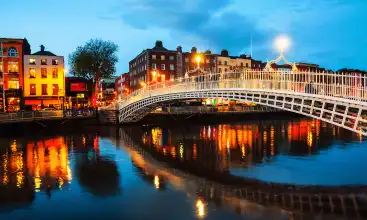
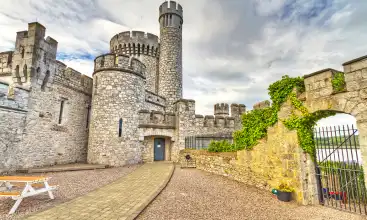
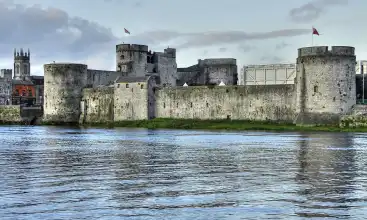
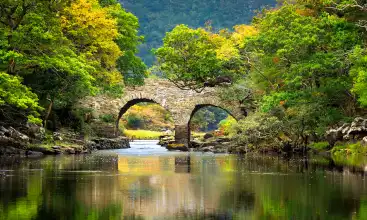
Popular rental locations in Ireland
Useful tips for a well-prepared trip
Which insurance should I choose, and what's the deal with the deposit? Read our articles with useful information and tips to ensure you choose the right rental car for you.

Location information for Ireland
Ireland is best explored by rental car. EasyTerra Car Rental has over 59 pick-up locations in Ireland. This means there is always a pick-up location close to your destination.
Most popular car hire locations in Ireland
Introduction
Ireland is an island located to the west of Great Britain. For years, the country was characterized by poverty, war and the struggle for independence. The troubles with Northern Ireland are still very much alive among the Irish population. Nevertheless, Ireland is an independent country with a fast growing economy and good prospects. Its beautiful nature, the many hiking and cycling routes and the historical landmarks make Ireland a popular holiday destination.
History
About 6000 AD, Ireland was inhabited by small groups of hunters. Around the fourth century BC, the Celts invaded the country. The Celts murdered a large part of the population and built a Celtic society. The language of the Celts (Indo-European) was the basis for the Irish language.
In 432 AD, the patron saint, Saint Patrick came to Ireland and introduced Christianity (Catholicism). The country became a Latin-Christian civilization where people could train to become a missionary in one of the many monasteries. The Irish missionaries were to a large extent responsible for the spread of Christianity in Western Europe.
In 795, the Viking raids began. Until 1014, they founded a number of settlements along the Irish coast. From there trade posts later grew cities like Dublin and Waterford. The Vikings were defeated by the Irish in the Battle of Clontarf. The English pope Hadrian IV gave Ireland to the English crown. It appeared that Ireland became a colony of England, but the Anglo-Normans did not succeed in subjugating Ireland.
The rift between Henry IV and the Catholic Church caused uprisings and division in Ireland. With the help of the Irish nobility, the king managed to introduce Anglicanism as the state religion. The struggle between Catholicism and Protestantism lasted for years.
In 1801, Great Britain and Ireland were officially united and called 'United Kingdom of Great Britain and Ireland'. In the following decades, the Irish economy went downhill. In 1845, there was a great famine. Due to a potato disease, the harvest failed for four years. More than a million Irish starved to death. Over two million people emigrated to, among other places, North-America, Australia, England and Canada.
At the beginning of the twentieth century, various political movements wanted more autonomy. Nationalist feelings grew stronger, and people were obliged to learn the Irish language in school. In 1912, it appeared that Ireland would have self rule, but the law was obstructed by the protestant province of Ulster. On April 24, 1916, the Easter Riot broke out. Republicans proclaimed the independent Irish Republic. England responded by killing the leaders of the uprising. The result was an intensification of nationalist feelings, which led to the foundation of the Republican Party 'Sinn Féin', which means "ourselves".
After that, the Irish struggle for independence started. The Irish attacked English targets and England responded violently. The official Irish state was founded in 1922. A number of Northern provinces refused to join this Catholic state. The protestant provinces remained part of England under the name Northern-Ireland. To this day, they are part of the United Kingdom and they are predominantly protestant.
During the Second World War, Ireland remained neutral, although many Irish fought alongside the British in Europe. In 1949, the Republic of Ireland was proclaimed. In 1973, Ireland joined the European Union. Its agriculture benefited from this and it also attracted foreign investment. There is still tension between Ireland and Northern-Ireland, despite the peace accord that was signed in 1998. Nevertheless, the future does look bright. Since the 1990's, the country has undergone an enormous economic transformation. Ireland is a leader in the area of high tech. The country is rich and no longer underdeveloped.
Society and Culture
Nowadays, Ireland has almost four million inhabitants. The country is sparsely populated and over a quarter of the population lives in Dublin. Almost 60% of the Irish lives in cities. There are various original minorities in Ireland: descendents from the Vikings and English Normans, nomadic groups and inhabitants whose ancestors are from Wales, England and Scotland.
Ireland has had to deal with massive emigration. There are more Irish in the United States than there are in Ireland. However, when the standard of living increased in Ireland, many Irish returned. Ireland's most recent immigrants came from England, Germany, France, United States, Nigeria and Romania.
There are two official languages: Gaelic (or Irish) and English. Gaelic is spoken in Ireland, England and Canada. English is still the official language in Ireland. Gaelic is taught in primary and secondary schools and is often used alongside English on road signs.
Most of the Irish are Roman-Catholic. The Roman-Catholics in Ireland live in peace with the protestant minority, unlike in Northern-Ireland. Many Irish go to church every week, although attendance numbers have been falling. The influence of the church on people's daily lives is still great. In addition to Catholics and Protestants, there are also Jews and Muslims in Ireland.
Irish are a traditional people who laugh a lot. The people are open and hospitable. It is impossible to think of Ireland without pubs. It has always been more than merely a pub: it is a public meeting house. Irish music and dancing are also very well-known. Dance contests are organized everywhere. Also, the Irish love festivals and events.
Political situation
Ireland is a republic with a parliamentary system. The president of Ireland is the head of state. He or she is elected every seven years. The prime minister is appointed by the president. Normally speaking, governments are formed by coalitions. The Irish parliament consists of a Senate and a House of Commons (House of Representatives). The Senate has 60 members. The House of Commons has 166 members and is elected by the people of Ireland every five years. All inhabitants of the Irish Republic who are 18 or older and have an Irish or British nationality are eligible to vote.
In 1990, Mary Robinson (of the Labour Party) became the first female president of Ireland. The election of a woman with social and feminist sympathies was good for Irish politics. It gave the changes in Irish society a face. Under her leadership, Ireland and Great Britain signed a peace initiative in 1993.
In 1997, Mary Patricia McAleese (of the Fianna Fáil party) was elected president. In 2004, she began her second term. At the moment, the country is governed by a coalition between Fianna Fáil and the Progressive Democrats. Fianna Fáil means 'Soldiers of Fate'. It is the largest party in Ireland and it was founded in 1926. What started out as a radical left-wing party has now become a conservative-democratic party.
Thanks to the leadership of Mary Patricia McAleese, the chances for peace with Northern-Ireland and England have increased. She also managed to transform Ireland into a country with a leading economy and growing wealth.
Economy
Since the 1990's, the Irish economy is subject to enormous change. Before that, the emphasis was on agriculture. Nowadays, Ireland is dependent on trade, industry and investments. Thanks to financial support from the EU and the arrival of many foreign companies, the economy has been able to prosper.
Agriculture still occupies an important place within the Irish economy. The export of, for example, milk and meat still provide important revenues. In addition to the export of agricultural products, among other things clothes, computers and machines are exported. The country imports mostly fuel, food products and petroleum. Ireland trades a lot with Great Britain, United States, Germany, France and The Netherlands.
The food and beverage industry is not the only major industry of Ireland. In particular the software and high-tech industries are growing rapidly. The steel industry and engineering are also important to the country.
The Irish government has played a major role in the recent economic progress. The government has tackled high inflation and reduced taxes. Government expenditure was stimulated and they attracted foreign investments. Since 1987, the partnership between government and unions has been a primary element of the economic policy.
In 1999, Ireland was among the first countries to adopt the euro. Because of its major economic growth, Ireland is sometimes called the "Celtic Tiger". But even the "Celtic Tiger" did not escape the global economic recession in 2001, although it was not hit as some others were, and the country's GDP kept growing.
The Irish economy is still growing and unemployment keeps falling. Whereas Ireland used to be one of the poorest countries in Europe, this republic now may call itself one of the richest countries in the world. That is a remarkable achievement.
Geography and Climate
Ireland is situated west of Great Britain. In the west, Ireland faces the Atlantic Ocean, and in the north the Northern Channel. Between Ireland and Great Britain is the Irish Sea, which is connected to the Celtic Sea in the south-west.
Ireland covers a surface of 84,288 square kilometers. Dublin is the capital of the country. Other large cities are Cork, Waterford, Limerick and Galway.
Most of Ireland is made up of rolling hills and low mountains. The central area is mostly plain. The west coast consists of cliffs and mountains. This is where Ireland's highest point is located: Carrantuohill, which is 1,041 meters high. In Galway Bay (on the west coast) the well-known Irish Aran islands are located. The east coast consists of beautiful sandy beaches. These beaches are often untouched and empty. The most important river is the Shannon. This river is 320 kilometers long and runs right through the country. Ireland does not have many forests, but thanks to its green landscapes it is often called the "green island".
Ireland has a maritime climate with cool summers and mild winters. The influence of the North-Atlantic currents is big; precipitation is above average in Ireland. In some parts of the country, it rains 275 days a year. Most precipitation falls in the winter months. Snow, on the other hand is rare. The average temperature in January and February is 4 degrees Centigrade. In the summer, the average temperature is between 17 and 22 degrees Centigrade. May and June are the sunniest months. The relatively cool summers made Ireland ideal for hiking.
Traffic and Infrastructure
Because Ireland is an island, people travel there mostly by plane. The only Irish airline is Aer Lingus-Irish International Airways. Other airline companies that fly to and from Ireland are Ryanair, British Midland Airlines, British Airways and EasyJet. In Ireland there are a number of large airports: Dublin International Airport, Waterford Airport Cork Airport, Kerry Airport (Farrenfore), Shannon Airport and Galway Airport.
Many people also travel to Ireland by boat. Important ports are Cork, Dublin, New Ross, Shannon Foynes and Waterford. Two leading ferry companies are Stena Line and Irish Ferries. There are connections to the United Kingdom and France.
The share of bus services in public transport is large. The national bus company is Bus Eireann. There are buses between most of the cities and villages in the country. In the low season there are fewer buses than in the high season. Generally speaking, bus drivers are friendly and they will even pull over of you are not waiting at a bus stop. In parts of the country where Bus Eireann is not active, you can use a commercial bus service.
Iarnród Eireann (Irish Rail) is the national railway company. There are trains between Dublin and most other major cities (including cities in Northern-Ireland like Belfast). There are no connections to smaller places in Ireland. Travelling by train is considerably more expensive than travelling by bus. The railways are mostly used to transport goods.
If you want to see all the beautiful places in Ireland, the best way is to rent a car. It gives an enormous sense of freedom to be able to visit places that cannot be reached by public transport. Ireland's road network is reasonably good. Do pay attention to the road signs. Only the green signs indicate kilometers. The speed limits are indicated in miles. Seat belts are obligatory and it is important to know that parking in the major towns is often not free.
Food and drink
The Irish kitchen is known for its tasty (farmer's) cheeses, fresh fish and seafood. The food is diverse and the quality is high. 'Irish stew' is a traditional Irish dish: a lamb stew with potatoes and onions. Some other Irish specialties are black pudding, soda bread (dark crumbly bread) and various potato dishes.
In many towns and villages you can enjoy Irish farmer's markets. They offer a unique opportunity to taste regional products. For the real culinary attractions you need to go to the harbor town of Kinsale in Cork. Here, traditional products are made. In restaurants it is customary to leave a 10% tip. Often, the tip will be added to the bill.
The Irish spend a lot of time in friendly pubs, and they like the occasional alcoholic beverage. There is a lot of dancing and laughing to the taste of a pint of Guinness. The Irish also love spirits. Whiskey and poteen (a national drink) are popular drinks.
Accommodation
In terms of accommodation Ireland has a lot to offer, ranging from a hotel in the big city to a farmhouse in the country. Also, there are lots of Bed & Breakfasts everywhere. Also, there are plenty of campsites where you can enjoy the country's beautiful countryside and clean air. Hostels offer cheap accommodation. Ireland has over 200 hostels in cities and in the country. Whatever form of accommodation you may choose, rest assured that you will be made to feel more than welcome. The Irish have a way of making people feel at home.
Time zone
Ireland has a time zone of GMT +2, which is one hour behind Central European Time.
External Sources
For more information about Ireland, we recommend Google and the following external sources:
Practical information
-
CurrencyEuro
-
Driving directionLeft
-
City speed limit50 km/h
-
Freeway speed limit100 km/h
-
LanguageEnglish, Irish
-
Popular car categoryEconomy
What most people want to know
The following questions and answers are a selection of the most popular questions. If you do not find the answer to your question, have a look at the Frequently Asked Questions page or contact us.
- Enterprise
- Thrifty
- Alamo
- National Car Rental
- Carhire
- Budget
- Sixt
- Keddy By Europcar
- Payless Car Rental
- Dollar Rent a Car
- Avis
- Europcar
- Flizzr
- Hertz
- Easirent
- Irish Car Rentals
- Apollo Car Rental
- Your Rent
- Celtic Motorhomes
- McRent
